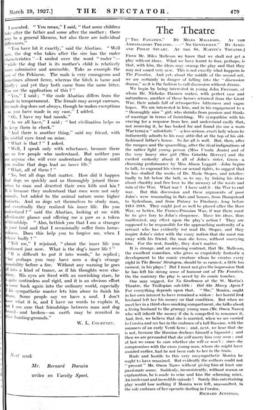The Theatre
r THE FANATICS." Br MILES MALLESON, AT THE AMBASSADORS THEATRE. " No GENTLEMAN." Br AIMEE AND PHILIP STUART. AT THE ST. MARTIN'S THEATRE.] FROM Mr. Miles Matteson we know that we shall not get a play without ideas. What we have learnt to fear, perhaps, is that, with him, the ideas may swamp the play and that they may not sound very new. This is not exactly what happens in The Fanatics. And yet, about the middle of the second act, we are certainly in danger of falling into the " discussion drama," as it is the fashion to call discussion without drama.
We begin by being interested in young John Freeman, of
whom Mr. Nicholas Hannen makes, with perfect ease and naturalness, another of those heroes returned from the Great War, their minds full of retrospective bitterness and vague hopes. We are interested in him, and in his engagement to a " thoroughly nice " girl, who shrinks from passion and thinks of marriage in terms of furnishing. We sympathise with his craving fora response from her, and understand easily that, not receiving it, he has looked for and found (to use a worn War term) a " substitute "—a less serious, ersatz lady whom he indiscreetly admits to his cosy attic-flat at the top of his old- fashioned father's house. So far all is well. But, then, after the rumpus and the quarrelling, after the rival indignations of the rather light young person (Miss Ursula Jeans) and of the very heavy nice girl (Miss Griselda Hervey) and the excited curiosity about it all of John's sister, Gwen—a charming performance by Miss Alison Leggatt—John begins to talk, to expound his views on sexual rights, to suggest that he has studied the works of Dr. Marie Stopes, and intellec- tually to hit below the belt, so to say, by linking his ideas about chastity and free love to the memory of the waste and ruin of the War. What war ? I have said it—the War to end war. But this discussion and these arguments of poor John's were resounding in flats and houses, from Hampstead to Sydenham, and from Putney to Finsbury, long before 1914-4918. They might just as well be placed after the Boer War, or better, the Franco-Prussian War, if war there must be to give fury to John's eloquence. Have his ideas, thus vociferated, any effect upon the play's action ? They arc • supposed to be responsible for the approaching maternity of a servant who has evidently not read Dr. Stopes, and they inspire John's sister with the crazy notion that she must run away with his friend, the man she loves, without marrying him. For the rest, frankly, they don't matter.
It is strange, and an amusing contrast, that Mr. Malleson,
the excellent comedian, who gives so exquisitely fantastic a development to the comic creature whom he creates every night in The Beaux' Stratagem, should be so earnest, a little too earnest, in his plays ! But I must not give the impression that he has left his strong sense of humour out of The Fanatics. On the contrary the play is saved by its comic touches.
One may suggest, for No Gentleman at the St. Martin's Theatre, the Trollopian sub-title : Did She Marry Again P For everything depends upon that. " She," Monica, ought in her own interest to have remained a widow : her horrid first husband left her his money on that condition. But when we meet her in a third-class smoking compartment, she talks about a living husband to the grumpy young man (Mr. Owen Nares) who will inherit the money if she is compelled to renounce it. And, first, we believe that she is married, when we are carried to Corsica and see her in the embrace of a tall Russian, with the manners of an early Verdi hero ; and, next, we hear that she is not, because the Russian declares himself a bigamist ; and then we are persuaded that she will marry him very soon ; and at last we cease to. care whether she will or won't ; since she compromises with the cross young man, whom she might have assisted earlier, had he not been rude to her in the train.
Rude and hostile to this very unsympathetic Monica he ought to have remained. But evidently the authors could not " present " Mr. Owen Nares without giving him at least one passionate scene. Suddenly, inconsistently, without reason or explanation, he is made to seize and kiss the scheming minx. An irrelevant and incredible episode ! Surely-this entertaining play would lose nothing if Monica were left, unassaulted, in the sole embrace of her operatic darling in Corsica.
RICHARD JENNINGS.






























































 Previous page
Previous page